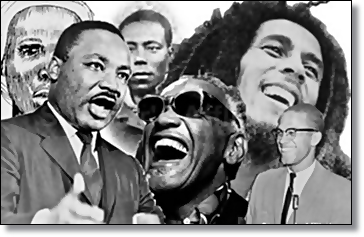Africa: Why Rear Views are Counterproductive

 |
While MLK’s leadership made minorities in US America to enjoy what they had been denied, in today's America, minorities, especially the African-American clan still face challenges. The question then is how can these minorities who feel their wings are clipped from soaring become pro-active in order to achieve their objectives and dreams? There appears to be a disconnect in the community in relation to the business of politics and politics of business. Consequently, there is very little that trickles down in terms of benefits to the community.
While the rear view look at past figures is necessary to grasp where we came from, I always wonder how much of the 'look' into the past helps to propel one to deal with their present circumstance in order to prevail and not just overcome. In a dynamic world where many past things are beginning to have little bearing on how we deal today, at what point do we lessen reaching into the past for bearing/direction/guidance on the present?
In minority community, especially African-Americans, the constant reference to past figures makes one wonder: does it mean those alive today are not capable of delivering to their constituent? Therefore, the yearning for foregone figures? Can we let the dead rest?
It is important that African-Americans embrace the 21st century and figure how to best leverage their presence in a country they literally built but one they have constantly and consistently felt like outsiders. MLK is not coming back, and if he did, I doubt his influence will be as he once had.
With an annual consumption that is about $1 trillion and 14% of US population, African-Americans own less than 4% of commercial real estate. They hardly own any bank in the billion dollar mark. Unemployment is highest in their community, and hardly any company owned by an African-American has 1,000 blacks employed. If labor is the most critical aspect of production, how come employing ourselves is never an aspect of our economic development agenda? With real estate as a significant portion of US wealth, how come it is not representative of our economic potential? When it comes to ownership of small businesses, our presence is marginal. Even though we are ranked and rated as the highest consumers of all ethnic groups, majority of the convenience stores in black neighbourhoods are owned by immigrants. Asians, practically new comers with less than 3% of US population, control about 8% of the commercial real estate sector.
African-Americans need to develop new approaches to maximize their resources lying in wait. There are more blacks with college education than Jews and Hispanics, yet these groups control significant sectors of the US economy. With more blacks graduating with PhDs annually than any other ethnic group, it's not only about formal education, but realizing and recognizing how to play in the big pond called US America.
I have no idea what MLK would do were he alive today. He probably would have been overwhelmed by challenges from his own community. But one thing I know, dead persons do not speak and they have no way to reach back to us. In their honour, we must build on what they left as legacy, by unapologetically embracing a drive to register our presence in sectors of the national and local economies we are marginally present. Without significant presence in the financial sector - ownership of community banks or investment funds, our access to capital and credit, will always limit any dream we have or the one someone dreamt for us.
The foundation of any successful community starts with strong family values. We must educate our children on the need for ownership, partnership and entrepreneurial strides, recognizing that building one's enterprise is an inalienable right they owe to themselves.
MLK opened the door, we must now enter the room and demand desiring place at the table. Look yourself in the mirror and say, 'Yes We Will.'
Ejike E. Okpa, II
Dallas, Texas.
